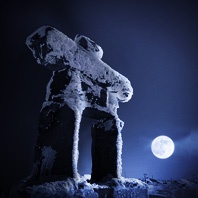Ice-cold legends

When taking a look at the Inuit [*] in the far north, you will find astonishing myths about the full moon. The Inuit live along the Arctic Ocean from the north east of Russia to Greenland and Canada, where coldness reigns. The culture is imprinted by an archaic consciousness, life is interwoven with legends that were never written down, due to harsh living conditions, but only passed down by word of mouth.
Because of the long arctic winter nights, the stars and the moon played a special role, and it goes without saying that stories developed from here. One particular legend tells the story of Malina, the sun goddess and her brother the moon god Anningan. Both grew up together as children in darkness. Having reached adulthood, a bitter fight raged between them one night, when Anningan raped his sister. Malina pushed him away from her and smudged ash in his face from an oil lamp. She then sought refuge in the sky and this is where she turned into the sun. Anningan gave chase to her and became the moon.
This pursuit continues to date and when Anningan catches up with Malina from time to time – so the story goes – a solar eclipse appears: the black moon pushes himself in front of the sun. The Inuit explain the waning and waxing of the moon by saying that Anningan does not eat anything during his chase and therefore looses a lot of weight, until he is invisible at new moon. Thereupon, he begins to eat again and gains weight until full moon. A perpetual cycle.
Admittedly, this is a very archaic perception of sky events and from our point of view, the battle between sun and moon may appear rather disconcerting. However, if we really contemplate accurately how we humans treat each other, how men and women chase each other, attract, antagonize and push each other away, then it seems that some truth is illustrated here.
Let’s take the course of the sun and the moon as an opportunity to meet each other peacefully and with love.

[*] We are deliberately not using the term »Eskimo«, as this is considered derogatory. It derives from »eskimantsik« which means »raw meet eater«. The North American Natives used this name in the past.
